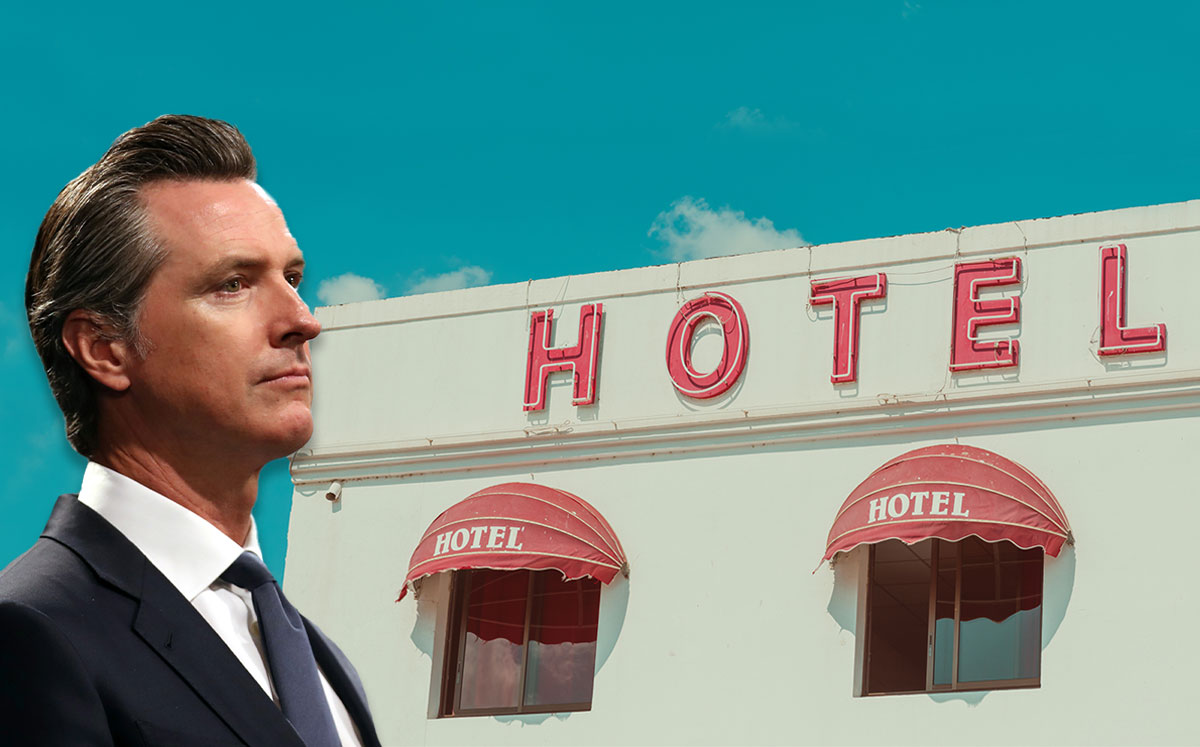A hotel industry devastated by the coronavirus emergency is being called upon to partake in a civic duty — housing the homeless.
California Gov. Gavin Newsom announced this week that the state has begun leasing rooms by the Oakland International Airport with a plan to house homeless there, and that 950 hotels have been identified throughout the state to provide quarantined shelter for the unhoused.
In theory, the state’s unprecedented policy action could address two problems at once: The public health matter of enabling social distancing among California’s reported 152,000 homeless individuals, and government subsidies to a hotel industry that is nationally losing $200 million in revenue every day due to the coronavirus, according to the National Hotel and Lodging Association.
But there are worries Newsom’s plan could produce unintended consequences, while doing little to either aid the homeless or hoteliers, who have yet to publicly buy-in to the policy.
“There are so many practical impediments that this seems like a pipe dream to me,” said Eric Sussman, a real estate professor at UCLA.
Those impediments include the state ordering not just hotels to go along with the plan but those hotels’ insurers. “The insurance companies could just say ‘no,’” Sussman speculated. “Is the hotel also supposed to provide mental health services? Drug counseling services?”
The professors’ concern that the plan would be more a compliance issue for hotels than actual benefit for the homeless was shared by homeless advocates.
“It’s a nice idea, but it’s a logistical nightmare,” said Casey Maddren, president of United Neighborhoods Los Angeles, who said it was unrealistic to put many homeless in a hotel room as some may not have the capacity for self-sufficiency.
The hotel industry, meanwhile, is largely mum on the issue.
Numerous messages left with the top hoteliers in Los Angeles and throughout California — including InterContinental Hotel Group and Hyatt Hotels Corp. — were not returned.
A spokeswoman for one top franchise, Choice Hotels International Inc., (owner of the Comfort Inn, Quality Inn, and Econo Lodge chains) said housing the homeless was a matter left up to the “individual property owners” of each hotel.
The California Hotel and Lodging Association said owners reluctance to respond could relate to the state policy not being totally fleshed out.
“It is a very complicated issue, and while state and local government officials are trying to figure it out, there’s no clear plan now as far as we know,” said Pete Hillan, a spokesman for the California Hotel and Lodging Association.
Hillan said that his industry is specifically in the dark about what hotels might be used, and how long homeless would occupy the inns.
“Addressing this pandemic is the top priority, but we also have to be good stewards of our businesses,” Hillan said.
A coronavirus bill that the state legislature passed Monday green lighted the governor’s office https://therealdeal.com/la/2019/01/11/california-to-withhold-funding-from-cities-that-skimp-on-housing-construction-newsom/ to allocate up to $1 billion in coronavirus emergency relief as Newsom saw fit.
Newsom responded Wednesday by directing an initial $150 million tranche for local emergency homelessness actions, including $100 million toward local governments, and $50 million to “purchase travel trailers and lease rooms in hotels, motels, and other facilities in partnership with counties and cities.”
The state’s first action was leasing two hotels with 393 rooms in Oakland, and transferring control to Alameda County.
It was unclear as of Thursday afternoon which hotels and hoteliers have agreed to participate, and if more state monies would soon become available for the effort. Los Angeles Mayor Eric Garcetti supported moving homeless into hotels during a press conference Tuesday evening, but the first citywide homeless shelter program has focused on rec centers, and not hotels.
What is clear is that the coronavirus has eviscerated the hotel industry. The National Hotel and Lodging Association estimates that the industry has lost $1.5 billion so far, and is set to lose about $200 million each day during the crisis.
A preliminary estimate from the trade group has 800,000 to one million hotel jobs lost nationally from the coronavirus emergency. That compares to 140,000 lost jobs during the Great Recession, and 120,000 pink slips following the Sept. 11, 2001 terrorist attacks.
Hillan of the hotel trade group glumly predicted that any state bailout would have a minimum impact on his members. “It is a little tough to see economic opportunity with all that has been going on.”
